Fruity herbal teas are a fantastic way to replace caffeinated varieties, offering a range of delicious flavors without the jitters. You can try berry-based blends with raspberry and blueberry for a revitalizing taste, or enjoy tropical infusions featuring pineapple and mango for a sweet twist. Consider combinations like hibiscus and mint for a tangy kick or citrus blends with lemon ginger for an invigorating experience. These teas are not only hydrating but also rich in antioxidants and vitamins. If you're curious about brewing techniques and more unique flavor ideas, there's plenty more to discover!
Benefits of Fruity Herbal Teas
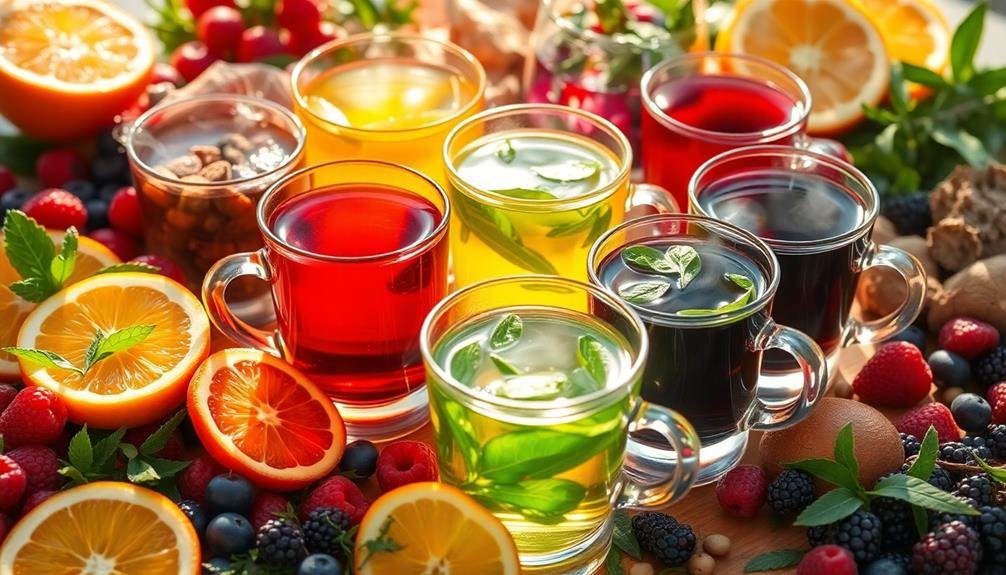
Fruity herbal teas offer a delightful way to boost your health while indulging your taste buds. These vibrant brews come packed with a variety of benefits that can enhance your well-being.
First, they're naturally caffeine-free, so you can sip them anytime without worrying about jitters or disrupted sleep. This makes them perfect for evening relaxation or a soothing afternoon break.
Additionally, fruity herbal teas often contain antioxidants that help combat free radicals in your body. By incorporating these teas into your daily routine, you're supporting your immune system and promoting overall health.
Many fruity herbal blends also boast anti-inflammatory properties, which can help reduce the risk of chronic diseases over time.
Moreover, these teas are often rich in vitamins and minerals, providing a nutritious boost without added sugars or calories.
Whether you're looking to hydrate or simply enjoy a flavorful drink, fruity herbal teas are an excellent choice. You'll find that they can uplift your mood and refresh your senses.
Popular Fruity Herbal Ingredients
When you explore fruity herbal teas, you'll often find berry-based blends and tropical fruit infusions stealing the spotlight.
These ingredients not only add vibrant flavors but also provide unique health benefits.
Let's take a closer look at what makes these fruity components so popular.
Berry-Based Herbal Blends
Plunge into the vibrant world of berry-based herbal blends, where flavors burst with each sip. These delightful concoctions not only tantalize your taste buds but also provide a wealth of health benefits.
You'll find that berry blends can be both revitalizing and soothing, making them a perfect alternative to caffeinated beverages.
Here are some popular berry ingredients you might encounter:
- Raspberry: Known for its sweet-tart flavor, raspberry leaves can aid digestion and promote relaxation.
- Blueberry: Packed with antioxidants, blueberries support heart health and boost your immune system.
- Strawberry: With its naturally sweet taste, strawberry adds a rejuvenating twist while providing vitamin C and fiber.
When you savor a cup of berry-based herbal tea, you're not just enjoying a delicious drink; you're also indulging in a blend that can uplift your mood and invigorate your senses.
Whether you're cooling down on a hot day or winding down in the evening, these fruity blends offer a delightful escape from the ordinary.
Tropical Fruit Infusions
Tropical fruit infusions offer a rejuvenating escape, transporting you to sun-soaked beaches with every sip. These vibrant blends are perfect for anyone looking to swap out caffeine for a fruity, invigorating experience. You can enjoy the natural sweetness and zing of tropical flavors like pineapple, mango, and passion fruit.
Here's a quick look at some popular tropical fruit infusion ingredients and their benefits:
| Ingredient | Flavor Profile | Health Benefits |
|---|---|---|
| Pineapple | Sweet, tart | Rich in vitamins, aids digestion |
| Mango | Sweet, juicy | High in antioxidants, boosts immunity |
| Passion Fruit | Floral, tangy | Good source of fiber, promotes heart health |
| Coconut | Creamy, nutty | Hydrating, supports skin health |
Each infusion not only delights your taste buds but also brings a range of health benefits. You can brew these fruity blends hot or cold, making them versatile for any season. So, next time you want an invigorating beverage, reach for a tropical fruit infusion and enjoy a mini-vacation in a cup!
DIY Herbal Tea Blend Recipes
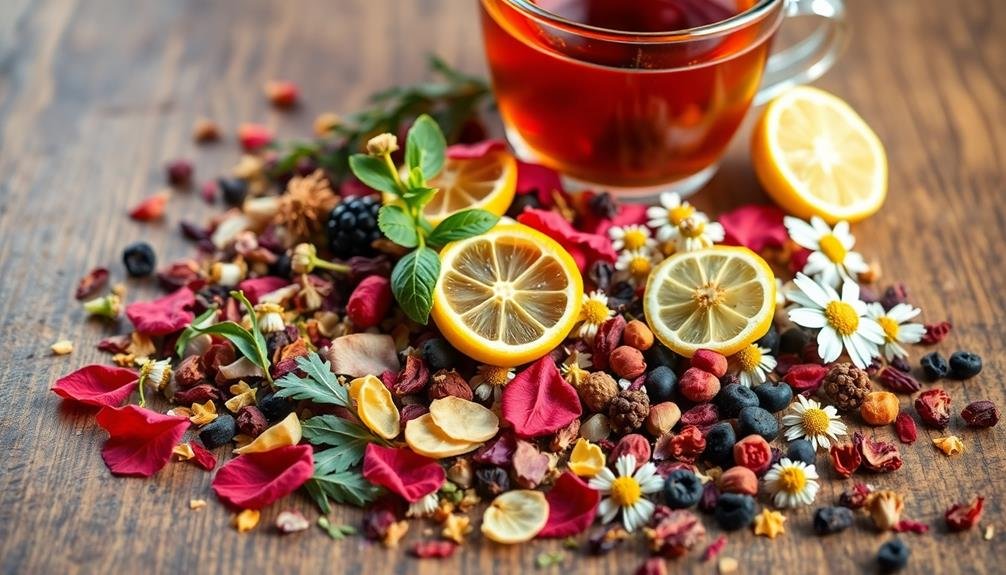
Creating your own herbal tea blends is a fun way to explore flavorful fruit combinations that suit your taste.
You'll find an easy-to-follow guide on herbal ingredients and simple brewing techniques to make the process enjoyable.
Let's get started on crafting your perfect cup!
Flavorful Fruit Combinations
Crafting your own herbal tea blends can be a delightful way to explore a variety of flavors and aromas. By experimenting with fruity combinations, you'll create unique blends that not only taste great but also offer invigorating alternatives to caffeinated teas.
Here are three flavorful fruit combinations you can try:
- Citrus Breeze: Combine dried orange peel, lemon verbena, and hibiscus for a zesty, tangy infusion.
- Berry Bliss: Mix dried strawberries, raspberries, and blueberries to create a sweet, vibrant tea that's perfect for iced versions.
- Tropical Escape: Blend dried pineapple, coconut flakes, and mango for a taste of the tropics that transports you to a sunny beach.
To make your own herbal tea blend, simply measure equal parts of your chosen ingredients, mix them together, and store them in an airtight container.
Adjust the ratios to suit your taste preferences, and feel free to add other herbs or spices for an extra kick.
With these flavorful fruit combinations, you'll find yourself sipping on delightful herbal teas that can replace your usual caffeine fix!
Herbal Ingredients Guide
Exploring fruity combinations is just the beginning of your herbal tea journey. To create your own delicious blends, you'll want to gather a variety of herbal ingredients. Start with a base like chamomile or rooibos, which offer a naturally sweet and soothing flavor.
Next, add dried fruits such as hibiscus, apple pieces, or orange peel for a burst of fruity goodness. These ingredients not only enhance the taste but also bring vibrant colors to your tea.
Consider adding herbs like peppermint or lemongrass for an invigorating twist that complements the fruitiness.
Spices can elevate your blend, too. A pinch of cinnamon or ginger can add warmth and depth, making your tea even more delightful. Experiment with ratios to find your perfect balance, and don't be afraid to try unconventional combinations.
Once you have your ingredients, simply mix them together in a jar and label it with your unique blend name. This way, you'll have your custom herbal tea ready to enjoy whenever you wish.
Brewing Techniques Simplified
When it comes to brewing your homemade herbal tea blends, simplicity is key. You don't need a fancy setup to enjoy a delightful cup. Just gather your ingredients, and follow these straightforward steps for the best results.
- Choose Your Base: Start with a base like chamomile, hibiscus, or peppermint, depending on your flavor preference.
- Add Fruits and Spices: Enhance your blend by adding dried fruits like apple or berries, along with spices like cinnamon or ginger for an extra kick.
- Steep Properly: Use boiling water and steep your blend for 5-10 minutes, adjusting the time based on your taste preferences.
Once you've perfected your blend, you can store it in an airtight container.
When you're ready to enjoy, simply measure out your desired amount and brew!
Experiment with different combinations to find what you love best. Herbal teas are forgiving, so don't be afraid to get creative.
With these simplified techniques, you'll soon be crafting delicious fruity herbal teas that can easily replace your caffeinated varieties!
Hibiscus and Its Flavor Profile
Hibiscus tea bursts with a vibrant, tangy flavor that's both invigorating and slightly tart, making it a favorite among herbal tea enthusiasts. When you take a sip, you'll notice a revitalizing burst of acidity that dances on your palate, reminiscent of cranberries or pomegranates. This unique taste sets hibiscus apart from more traditional herbal teas, offering a delightful change of pace.
You might appreciate hibiscus for its versatility, too. Whether you enjoy it hot or iced, the flavor remains bright and bold. You can easily blend it with other ingredients to create various flavor profiles. Adding a touch of honey or agave nectar can balance the tartness, while a squeeze of lemon enhances its zesty notes.
Another exciting aspect of hibiscus is its stunning deep red hue. This visually appealing color can elevate your tea experience, making it as enjoyable to look at as it's to sip.
Plus, its naturally caffeine-free nature means you can indulge anytime without worrying about jitters. If you're seeking a fruity and invigorating herbal tea, hibiscus is definitely worth a try. You won't be disappointed!
Berry-Infused Herbal Combinations
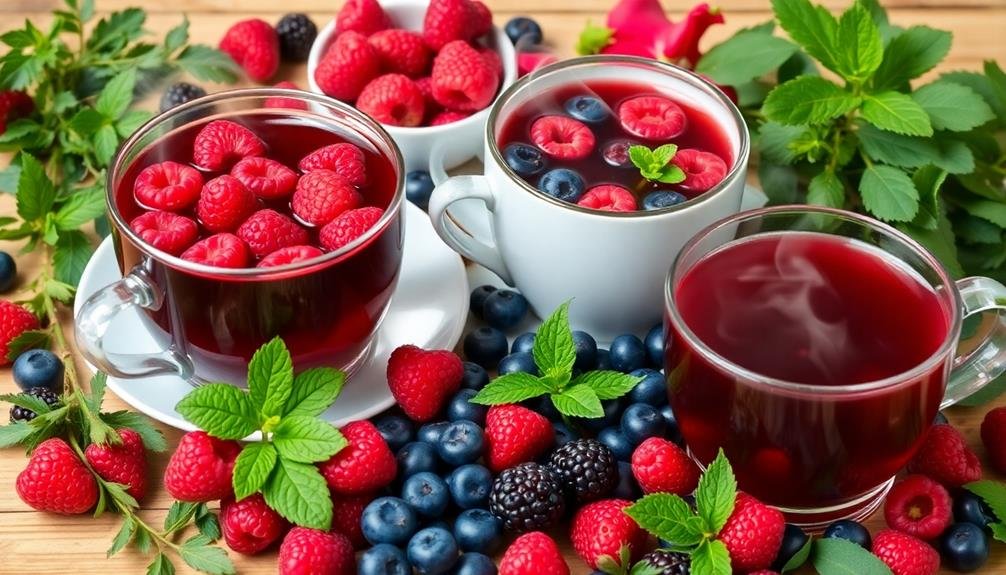
Berry-infused herbal combinations offer a delightful way to elevate your tea experience. These blends not only provide vibrant flavors but also pack a nutritional punch. You can enjoy a variety of berries, each bringing its unique taste and health benefits to your cup.
Here are three fantastic berry combos you might want to try:
- Raspberry and Hibiscus: The tartness of raspberries complements the floral notes of hibiscus, creating a rejuvenating, vibrant brew.
- Blueberry and Chamomile: The sweet, subtle flavor of blueberries pairs beautifully with the calming properties of chamomile, perfect for winding down your day.
- Strawberry and Mint: The sweetness of strawberries combined with the coolness of mint makes for a revitalizing tea that's great hot or iced.
Experimenting with these berry herbal combinations can transform your routine into something exciting.
You'll not only enjoy the rich flavors but also savor the health benefits that come with each sip.
Citrus-Based Herbal Tea Ideas
If you're looking to rejuvenate your herbal tea repertoire, citrus-based blends can add a zesty twist to your daily brew.
Start with a classic lemon ginger tea. Simply steep fresh ginger slices in hot water, then add a squeeze of lemon for a warming, invigorating cup.
Another fantastic option is orange mint tea. Combine dried orange peels with fresh mint leaves, and steep them in boiling water. The bright citrus notes complement the cooling mint, creating a revitalizing drink perfect for any time of day.
If you want something a bit more adventurous, try grapefruit rosemary tea. Steep fresh rosemary needles in hot water, then add a splash of grapefruit juice for a unique herbal experience that's both savory and tart.
For a calming evening option, consider chamomile with a hint of lemon. Brew chamomile flowers and add a few drops of lemon juice for a soothing tea that helps you unwind.
These citrus-based herbal teas not only provide delightful flavors but also pack a punch of antioxidants and vitamins.
Tropical Fruit Tea Inspirations
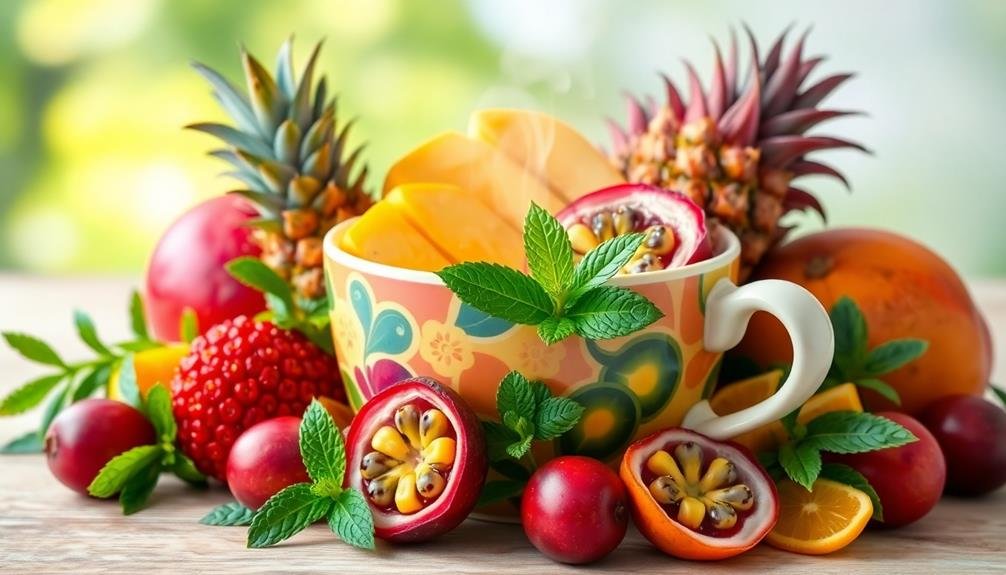
When you think of tropical fruit teas, vibrant flavors come to mind, like pineapple and mango mingling in a revitalizing blend.
Not only are these drinks delicious, but they also pack a punch of health benefits, from boosting your immune system to improving digestion.
Let's explore some tasty combinations that can brighten your day and enhance your well-being.
Flavorful Tropical Blends
Tropical fruit teas offer a vibrant escape for your taste buds, blending the essence of sun-kissed fruits with soothing herbal notes.
These flavorful blends transport you to a breezy beachside paradise with each sip. Imagine the invigorating taste of a tropical tea that captures the essence of your favorite fruits, whether it's tangy pineapple, zesty mango, or juicy passionfruit.
When you explore these enticing blends, you'll discover that they can easily brighten your day.
Here are some delightful combinations to reflect upon:
- Pineapple Coconut Fusion: A sweet and creamy blend that brings the tropics to your cup.
- Mango Hibiscus Delight: The tartness of hibiscus pairs beautifully with ripe mango, creating a invigorating treat.
- Passionfruit Mint Refresh: This blend combines the exotic flavor of passionfruit with the cooling touch of mint, perfect for a hot day.
With so many vibrant options, you can easily find a tropical fruit tea that satisfies your cravings while providing a delightful alternative to traditional caffeinated brews.
Health Benefits Explored
Exploring the health benefits of fruity herbal teas reveals a treasure trove of wellness advantages. These delicious brews, packed with tropical flavors, can boost your health in numerous ways.
For starters, many fruity herbal teas, like hibiscus or mango, are rich in antioxidants, which help combat oxidative stress and may reduce the risk of chronic diseases.
Moreover, the natural sweetness in these teas can satisfy your cravings without added sugars, making them a great alternative for those looking to maintain a healthy diet. You'll also find that some tropical fruit teas, such as passion fruit, can aid digestion and support gut health, thanks to their fiber content.
Additionally, sipping on these herbal blends can keep you hydrated, which is essential for overall well-being. The calming effects of these teas can also help reduce stress and promote relaxation, contributing to better mental health.
Combining Herbs With Fruits
Combining herbs with fruits creates a delightful fusion that enhances both flavor and health benefits in your tea. When you blend these elements, you can enjoy a harmonious balance of sweetness, tartness, and earthy notes. The ideal combinations not only make your tea more enjoyable but also elevate its nutritional profile.
Here are three key benefits of blending herbs with fruits:
- Enhanced Flavor: Fruits can add natural sweetness and bright acidity, while herbs contribute depth and complexity. This combination can create a revitalizing drink that excites your taste buds.
- Increased Health Benefits: Many herbs and fruits are packed with antioxidants, vitamins, and minerals. By mixing them, you can boost your immune system and overall well-being.
- Aromatherapy: The fragrant qualities of herbs like mint or chamomile paired with fruits like lemon or berries can uplift your mood and provide a calming experience, making your tea ritual more enjoyable.
Experimenting with various combinations allows you to discover your favorite flavors while reaping the rewards of nature's bounty.
Serving Suggestions for Herbal Teas
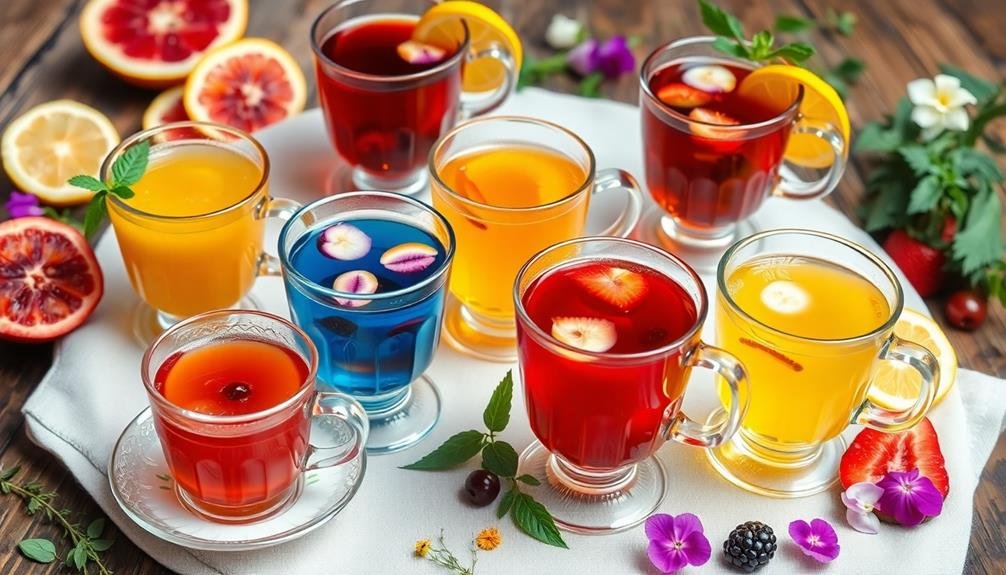
When it comes to serving herbal teas, there's no shortage of creative ways to elevate your experience. Start by choosing a beautiful teapot or infuser that complements the colors of your fruity herbal blend. This not only enhances the visual appeal but also sets the mood for your tea time.
Consider serving your herbal tea iced on hot days. Brew a strong batch, then chill it, adding slices of fresh fruit like lemon, berries, or peaches for an extra flavor kick. You could also sweeten your tea with honey or agave syrup, balancing the natural tartness of the fruits.
For a cozy evening, steep your herbal tea in a mug, and add a splash of almond or oat milk for creaminess. Garnish with a sprinkle of cinnamon or a fresh herb, like mint, to make it extra special.
Don't forget about pairing! Enjoy your herbal tea with light snacks like almond cookies or fruit platters. This combination can enhance the flavors and make your tea experience even more delightful.
Experiment with these serving suggestions, and you'll discover endless ways to enjoy your herbal teas!
Storage Tips for Herbal Blends
Proper storage is essential for maintaining the freshness and flavor of your herbal blends. If you want to enjoy the vibrant taste of your fruity herbal teas, following a few simple steps can make all the difference.
Here's how to store your blends effectively:
- Keep them airtight: Use an airtight container to protect your herbs from air exposure, which can lead to loss of flavor and potency. Glass jars or metal tins work great.
- Avoid light and heat: Store your containers in a cool, dark place away from direct sunlight and heat sources. This helps preserve essential oils and prevents degradation.
- Label and date: Always label your containers with the blend name and date of purchase or preparation. This way, you can easily keep track of freshness and avoid using old blends.
Transitioning From Caffeinated Teas
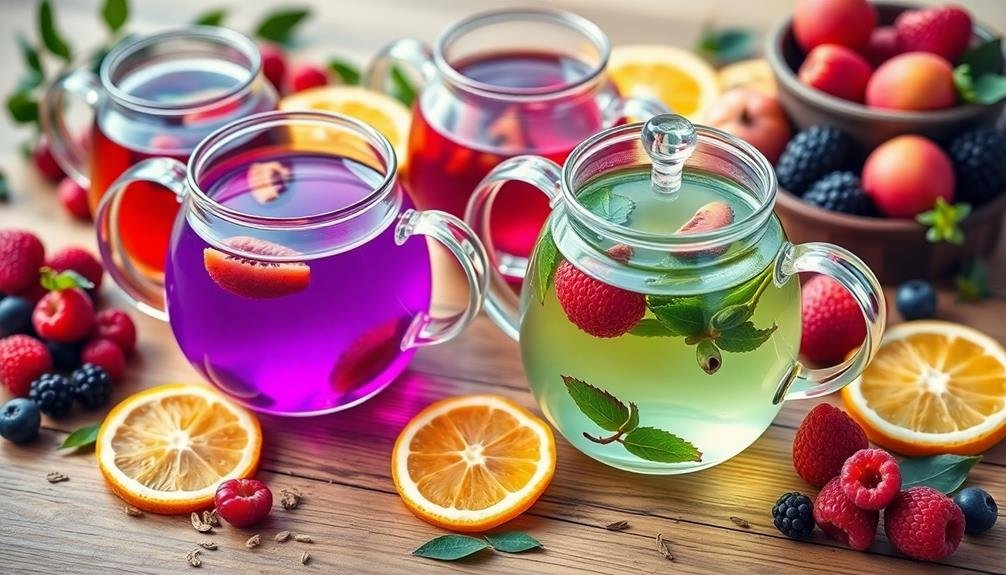
Making the switch from caffeinated teas to fruity herbal blends can be a revitalizing change that benefits your overall well-being. You might feel a little apprehensive at first, especially if you're used to the energy boost that caffeine provides. But changing doesn't have to be intimidating.
Start by gradually replacing your regular tea with herbal options. For instance, if you usually have two cups of black tea a day, try swapping one of those for a fruity herbal blend. Choose flavors you love, like hibiscus or raspberry, to make the change enjoyable. You'll find that these herbal teas can be just as satisfying and invigorating.
Pay attention to your body's response as you reduce caffeine. You might experience some withdrawal symptoms, like headaches or fatigue, but these will pass. To ease this process, consider incorporating more hydration with water or herbal infusions.
Experiment with different brewing times and temperatures to discover your preferred flavor profiles.
Before you know it, you'll be fully immersed in the delightful world of fruity herbal teas, reaping the benefits of reduced caffeine without sacrificing taste or enjoyment.
Frequently Asked Questions
Can Fruity Herbal Teas Help With Anxiety or Stress Relief?
Fruity herbal teas can definitely help with anxiety and stress relief. They often contain calming ingredients like chamomile or lavender, which soothe your mind and promote relaxation, making your day feel a little less overwhelming.
Are Fruity Herbal Teas Suitable for Children?
Yes, fruity herbal teas are generally suitable for children. They offer a flavorful, caffeine-free option that can be enjoyed warm or cold. Just make sure you choose blends that don't contain any allergens or strong herbs.
How Do Fruity Herbal Teas Affect Digestion?
Fruity herbal teas can aid your digestion by soothing your stomach and promoting healthy gut function. They're often caffeine-free, making them a great choice for relaxing after meals without the jitters from traditional teas.
Can I Drink Fruity Herbal Teas Before Bedtime?
Yes, you can drink fruity herbal teas before bedtime. They're often caffeine-free and can help relax you. Just be mindful of any ingredients that might cause you to wake up during the night.
Are There Any Allergic Reactions to Fruity Herbal Teas?
Yes, you can experience allergic reactions to fruity herbal teas. If you're sensitive to certain fruits or herbs, it's wise to read labels carefully and start with small amounts to gauge your body's response.
In Summary
Switching to fruity herbal teas can be a revitalizing and healthful change from caffeinated varieties. You'll find a delightful range of flavors and benefits that can energize and soothe you without the jitters. Experiment with different combinations of herbs and fruits to discover your perfect blend, and don't forget to store your creations properly for maximum freshness. Embrace this flavorful journey, and enjoy the natural goodness of herbal teas in your daily routine!

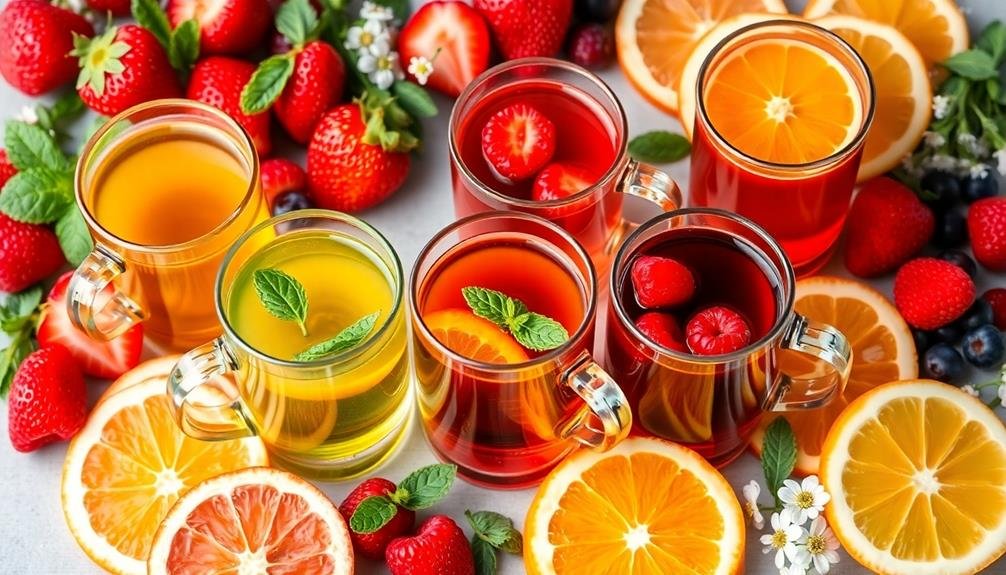
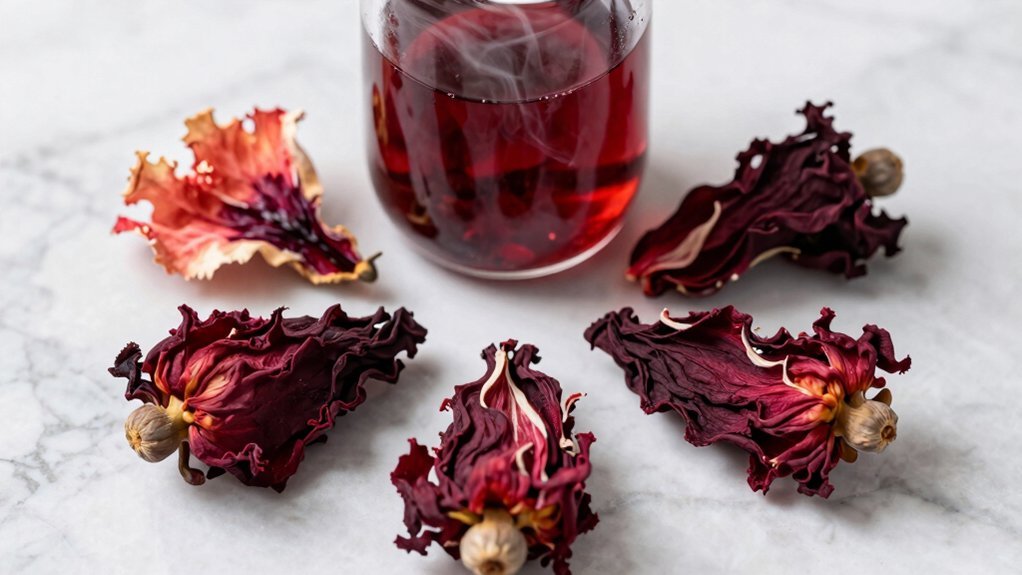


Leave a Reply